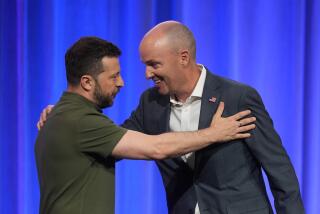Afghan Rebel Leaders Call on Reagan for U.S. Support
- Share via
WASHINGTON — Four leaders of the resistance movement in Afghanistan met with President Reagan and other top Administration officials Monday in an effort to persuade them to step up U.S. support for their fight against the Marxist regime in Kabul.
“We will not let you down,” the President told the resistance leaders, according to a statement from the White House, and he said his commitment to the moujahedeen , as the rebels are known, is “unshakable.”
But he gave no indication that he would give the moujahedeen the air and ground defense weapons the resistance leaders say are essential to their fight.
Attending the meeting with Reagan and the four leaders were Secretary of State George P. Shultz, White House Chief of Staff Donald T. Regan and Vice-Adm. John M. Poindexter, national security adviser.
One rebel leader, Prof. Burhanuddin Rabbani, told the President, “The Soviets have turned our country into a bloodbath, but they will never be able to break the will of our people.”
The President resisted the rebels’ plea for full diplomatic recognition, telling them that it is “premature to resolve” that issue, although the Afghans’ war against Moscow is well into its seventh year.
While it opposes the Soviet-picked regime in Kabul, the Administration nevertheless maintains diplomatic representation there, and Reagan told the Afghan leaders that the U.S. presence “plays a role in our efforts to be helpful” to the resistance. If the Administration recognized the moujahedeen, he implied, U.S. diplomats would be expelled from the country and lose what leverage they have.
The Administration has stepped up covert aid to the rebels in recent years, and Reagan has publicly cited reports that Moscow has used chemical warfare and bombs disguised as toys in its attempt to crush the resistance. On Monday, the four leaders described in detail to Reagan what they alleged were further Soviet atrocities, including the mass burning of villages and the kidnaping of children.
At a news conference after the meeting with Reagan, Rabbani charged that “the Soviets have turned our country into a land of experiments for their latest weapons.” He said that his country “needs every and any kind of help it can get to fight a very strong superpower. Afghanistan cannot do it with an empty hand.”
Specifically, the Afghan leaders said they asked Reagan and the other top officials for anti-aircraft and anti-tank weapons. But “so far, no action has been taken,” said Ahmad Gailani, one of the leaders.
A written statement released by the delegation that met with Reagan assailed the West for being “fooled” by Soviet leader Mikhail S. Gorbachev. “It is true that he seems friendly,” the statement said. “But under that smiling face is the iron claw of the bear.”
Since Gorbachev came to power, the statement said, atrocities in Afghanistan have increased and Soviet special forces are now launching night-time assaults with greater effectiveness along the border with Pakistan.
The statement concluded with an impassioned letter from “a very famous commander”--Gen. George Washington--appealing for food and medical supplies at Valley Forge, Pa.
In a similar historical plea earlier in the day, Reagan compared his proposal for $100 million in aid for the Nicaraguan rebels to U.S. assistance to Britain during World War II.
Calling assistance to the Central American rebels “the right thing to do,” Reagan made a strong appeal for bipartisan support, declaring that “under those circumstances, there are no Republicans and no Democrats--just Americans.”
A decisive vote is expected later this month in the House on aid for the contras , as the Nicaraguan rebels are known.
Times staff writer Penny Pagano also contributed to this story.
More to Read
Sign up for Essential California
The most important California stories and recommendations in your inbox every morning.
You may occasionally receive promotional content from the Los Angeles Times.













